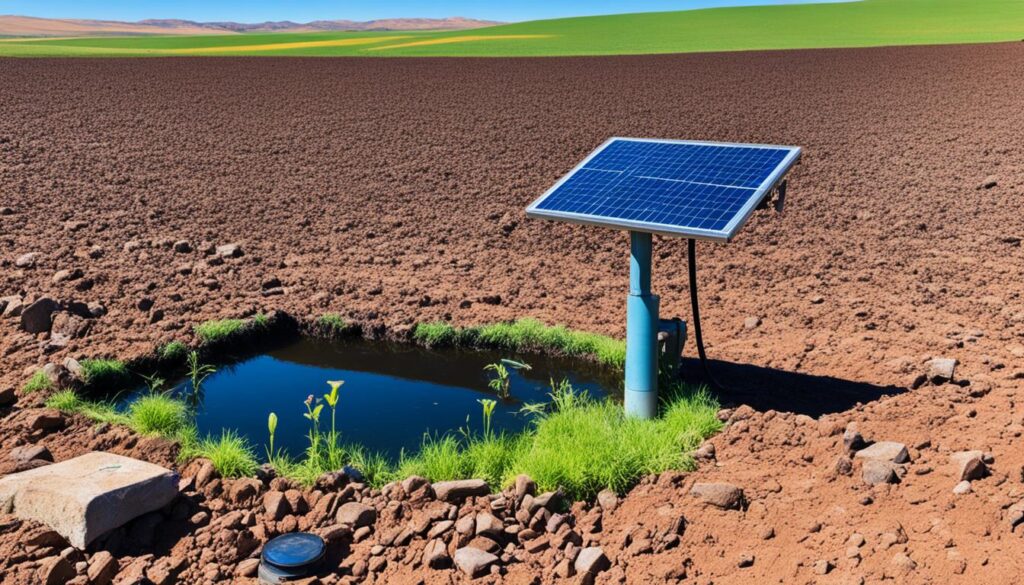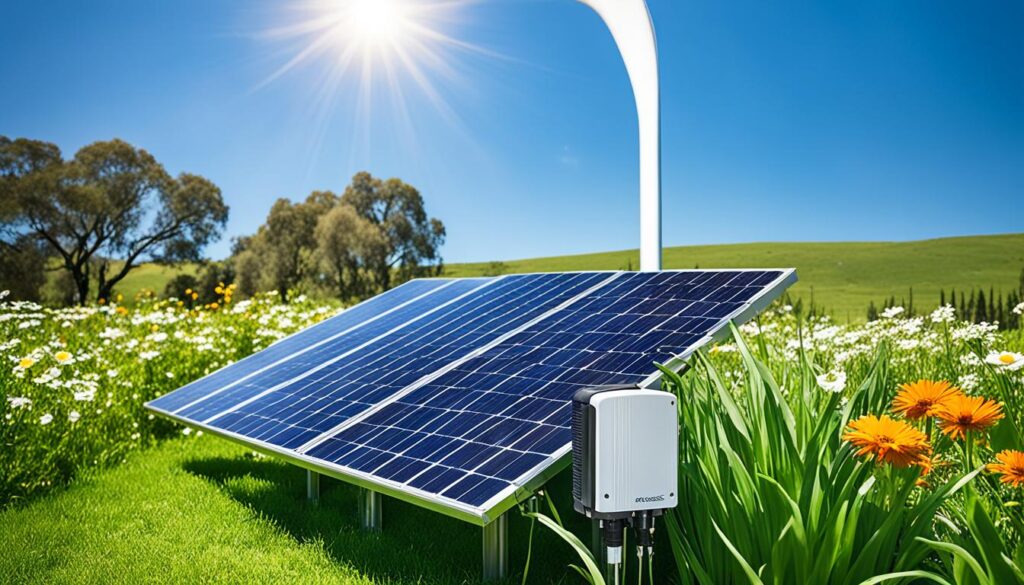Solar energy is a top choice for going green. It’s widely used in water pumping with solar-powered systems. These solar-powered water pumps get their energy from the sun. This means they give off no harmful gases and help cut carbon footprints.
They work well even in far off places where finding water is hard. This technology makes it easier to control how water is used. It stops too much water being used on plants and helps avoid water wastage.
Less need for fossil fuels is a big plus with these pumps. They are a steady, eco-friendly option, especially in places without power sources. This keeps water supply systems strong, even in the back of beyond.
Key Takeaways
- Solar-powered water pumps utilize clean and renewable energy from the sun, reducing greenhouse gas emissions and carbon footprints.
- These pumps can operate efficiently in remote locations, allowing access to previously inaccessible water sources.
- Solar-powered water pumps optimize water usage by providing precise control over water distribution, preventing over-irrigation and reducing water wastage.
- By reducing dependence on fossil fuels, solar-powered water pumps offer a reliable and sustainable alternative for water supply systems.
- The adoption of solar-powered water pumps can enhance the resilience of water supply systems, particularly in remote or off-grid areas.
The Environmental Impact of Solar-Powered Water Pumps
The environmental impact of solar-powered water pumps is huge. They offer a sustainable way to eco-friendly pumps water. This method deals with the big issues of traditional ways. They cut down greenhouse gas emissions, save water, and use less fossil fuels.
By using the sun’s power, these systems do a lot of good. They fight greenhouse gas emissions, save water, and reduce the need for fossil fuels.
Reduced Greenhouse Gas Emissions
Normal water pumps need either fossil fuels or off-grid solutions electricity. This leads to a lot of greenhouse gas emissions.
Solar-powered ones are different. They run on clean, renewable energy from the sun. This cuts down on direct emissions and lowers carbon footprints.
Using this technology, communities help fight climate change. They choose a more sustainable path.
Conservation of Water Resources
We are worried about water scarcity everywhere. The old pumps waste a lot of energy and water. Solar-powered pumps can work in far-away places. They make it easy to reach water in such spots.
These pumps also help use water smartly. They stop too much watering and lower the water wasted. By saving water, they help with sustainable agriculture and support nature. They make sure we have enough water in the long run.
Reduced Dependence on Fossil Fuels
Relying on fossil fuels for pumping water is bad for the Earth. It also brings up money and moving fuel troubles. Solar pumps are a good choice. They cut the need for fossil fuels, reduce costs, skip the fuel moving, and make water irrigation systems stronger. They are great for places not on the grid.

solar powered water pump: A Solution for Rural India
More than 300 million people in India live without electricity. This is equal to the entire population of the United States. Yet, this issue can be a big chance for growth. Companies are now offering solutions that do not need a main grid. These solutions are bringing more energy to everyone in India.
Overcoming Electricity Challenges
In India, many people work in farming. They are a big group that needs electricity. For instance, they can use electric pumps to water their crops. This helps them grow food faster and better. But, most rely on the rainy season to do this. The problem is, the pumps often stop working because of power cuts.
About 26 million of these pumps run on diesel or electricity. And they often stop because the power system is not very reliable.
Boosting Agricultural Productivity
Solar-powered irrigation is changing things for these farmers. It boosts their income, especially for those far from cities. By using the sun, these systems give steady water. This is even for places where the power grid does not reach.
Government Initiatives and Subsidies
The Indian government is also stepping up to help. It has started the PM-KUSUM scheme to encourage solar water pumps. This helps farmers get solar plants and pumps with a big discount. They can get up to 80% off. It is a push to make using solar energy easier for farmers.
Innovations in Solar Water Pumping Technology
Photovoltaic technology is making big leaps forward. With better solar panels, storage solutions, and smart features, managing water is getting easier. This is especially true for rural areas.
Improved Solar Panels
New solar panels are better at turning sunlight into power. They work well even when it’s not very sunny. This means water pumps can keep running all day. The new panels help these systems work more effectively and reliably.
Battery Storage Solutions
Systems now come with special batteries to hold extra energy. This extra energy is used when the sun is not shining or on cloudy days. With storage, water pumps can work anytime, making water supply stable. These batteries also make the systems tougher and flexible.
Smart Technology Integration
Smart technology is improving these systems too. It allows the pumps to change how fast they run based on the sun. This optimizes energy use and makes water management more efficient. It boosts the whole system’s performance and how much work it can do.
Remote Monitoring and Control
With high-tech tools, people can check on and control pumps from a distance. They can use cellphone apps or the internet. This makes it easier to handle any issues quickly and keep the system up and running. It’s all about making solar water systems work better.
Conclusion
Solar-powered water pumps are a great choice for places like rural India. They get their power from the sun. This means they help the environment by reducing harmful gases, saving water, and using less fossil fuel.
These pumps are ideal for areas where power is not reliable. They help farmers grow more crops. Plus, the government in India is helping through schemes like the PM-KUSUM program.
Solar technology keeps getting better. This means solar pumps work even when it’s not sunny. They use smarter technology to pump water efficiently day and night.
Using solar pumps means India is stepping into a cleaner future. It ensures people in rural areas have water. This method is good for the earth, helps farms, and makes rural places better overall.
It’s all about making India more self-sufficient and successful. Solar pumps are a key part of this brighter future for the country.
FAQ
What are the key benefits of solar-powered water pumps?
Solar-powered water pumps are great for many reasons. They cut down on harmful gases, save water, and use less fossil fuel. By using the sun’s energy, they are kind to the earth and help get water where we need it.
How do solar-powered water pumps contribute to environmental sustainability?
Solar pumps do a lot for the planet. They don’t use gas or rely on electricity from the grid, which means fewer greenhouse gases. They get water from new places and help not waste it, thanks to their smart water use.
How can solar-powered water pumps benefit rural communities in India?
Rural India can see big improvements thanks to solar pumps. They solve the problem of not enough electricity there, boost farming, and make life better for locals. The Indian government helps with the cost through schemes like PM-KUSUM.
What are the recent technological advancements in solar water pumping systems?
New technology makes solar water pumps work even better. We now have better solar panels, batteries that store more, and ways to use energy smarter. These systems can also be watched and controlled from far away.

